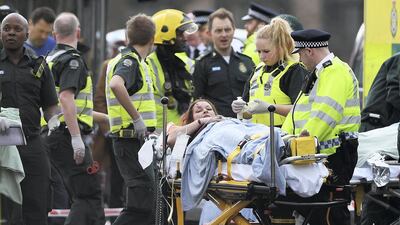Commuters and families are hurriedly rushing to catch their trains, unaware that a suspected terrorist has hidden a rucksack near one of the ticket machines.
The wires and bomb paraphernalia protruding from the side are the only clue that this might not be just another item of forgotten luggage in one of Britain’s busy railway stations.
But after a counter-terrorism protocol known as Hot (Hidden Obviously Typical) is put into play – Is the item hidden? Is it obviously suspicious? Would such an item typically be found in this location? – the police are called and move the public 100 metres or more away from the rucksack.
It is a staged exercise as part of a training programme by the Counter Terrorism Policing team for members of the public. With people beginning to move around again more freely in towns and cities as lockdown measures ease in coming weeks, police want them to be more vigilant when out and about.
The UK has been the target of a number of terror attacks in recent years, from the two at London Bridge to the Manchester Arena bombings, resulting in dozens of deaths.
Consequently, the police have created an online training course on which people take part in various exercises such as learning how to identify threats from terrorists acting suspiciously or going on reconnaissance missions to knife, firearm and bombing incidents.
Videos take participants through the different scenarios and are encouraged to click on potentially dangerous situations.
Examples range from a terrorist in a hospital where numerous security measures have not been taken, to a person acting suspiciously in a hotel and hazards hidden at a train station.
In one of the modules, a witness from the 2015 terror attack in Tunisia explains how she and her mother survived using the counter-terrorism training she had previously had. Thirty-eight people, including 30 British citizens, did not live through the incident in which Seifeddine Rezgui opened fire on holidaymakers on the beach in Port El Kantaoui, about 10km north of the city of Sousse.
The woman, who is not named, said her run-and-hide training led her to tell people to get off the beach and head to the hotel, where she urged them to go to their rooms.
In all, more than 500,000 people have become so-called CT Citizens through the Action Counters Terrorism (ACT) e-learning course that was launched two years ago. During lockdown, more than 700,000 people have completed the 45-minute programme, many from their kitchen tables.
Deputy assistant commissioner Lucy D’Orsi, the national policing lead for protective security, said that an incredible number had answered the call.
“We wanted to encourage more people to take the course and become CT Citizens as it can easily be done when you are working remotely, but the enthusiastic response has been even better than we had hoped,” she said.
“With everything people have had to cope with over the past couple of months, we are delighted that they want to continue supporting Counter Terrorism Policing and play their part in keeping all communities safe.
“And it is so important that they do, because as we start to move towards the easing of lockdown and the return of busy centres of activity, we need to remind everyone that the threat from terrorism has not gone away.
“Having more people with a basic level of awareness, and who know what to do if they see suspicious activity, is a real asset to the police.”
The interactive course, which is available to companies or private citizens, can be done all at once or in short modules.
It explains how to spot the signs of suspicious behaviour and what to do to help yourself, others and the emergency workers if an attack should take place.
To log on and learn, visit https://ct.highfieldelearning.com/


